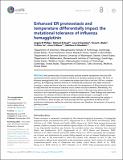Enhanced ER proteostasis and temperature differentially impact the mutational tolerance of influenza hemagglutinin
Author(s)
Phillips, Angela Marie; Gonzalez, Luna O.; Butty, Vincent L G; Shoulders, Matthew D.
DownloadPublished version (4.128Mb)
Terms of use
Metadata
Show full item recordAbstract
We systematically and quantitatively evaluate whether endoplasmic reticulum (ER) proteostasis factors impact the mutational tolerance of secretory pathway proteins. We focus on influenza hemaggluttinin (HA), a viral membrane protein that folds in the host’s ER via a complex pathway. By integrating chemical methods to modulate ER proteostasis with deep mutational scanning to assess mutational tolerance, we discover that upregulation of ER proteostasis factors broadly enhances HA mutational tolerance across diverse structural elements. Remarkably, this proteostasis network-enhanced mutational tolerance occurs at the same sites where mutational tolerance is most reduced by propagation at fever-like temperature. These findings have important implications for influenza evolution, because influenza immune escape is contingent on HA possessing sufficient mutational tolerance to evade antibodies while maintaining the capacity to fold and function. More broadly, this work provides the first experimental evidence that ER proteostasis mechanisms define the mutational tolerance and, therefore, the evolution of secretory pathway proteins.
Date issued
2018-09Department
Massachusetts Institute of Technology. Department of Chemistry; Massachusetts Institute of Technology. Department of Mathematics; Massachusetts Institute of Technology. Department of Biology; Koch Institute for Integrative Cancer Research at MITJournal
eLife
Publisher
eLife Sciences Publications, Ltd
Citation
Phillips, Angela M. et al. “Enhanced ER proteostasis and temperature differentially impact the mutational tolerance of influenza hemagglutinin.” eLife 7 (2018): e38795 © 2018 The Author(s)
Version: Final published version
ISSN
1534-4983